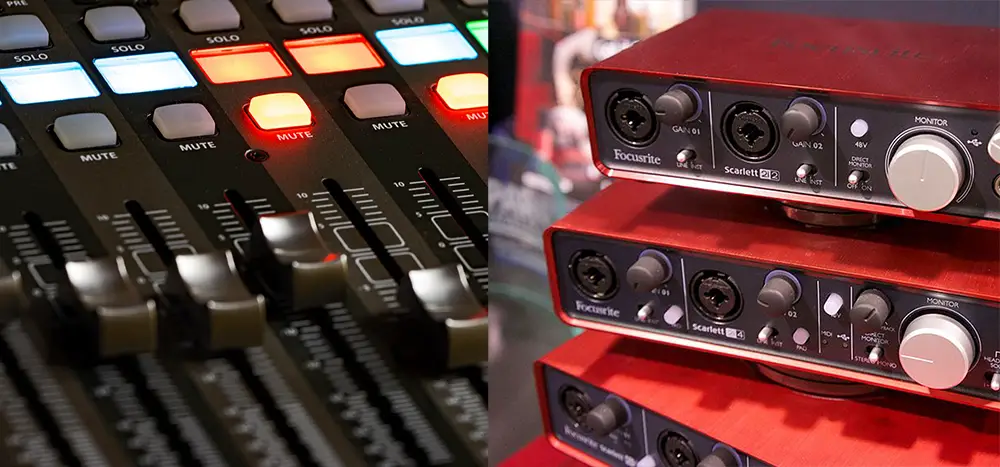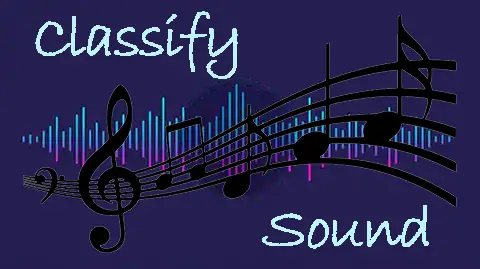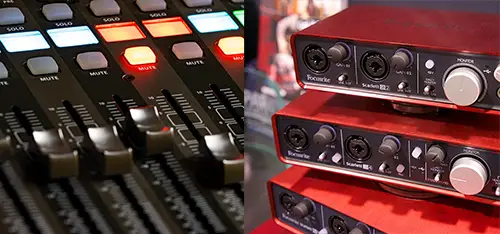
If you are just getting into recording music or another type of audio, it can be confusing what hardware you need to actually record. Many get confused about mixers and audio interfaces. You are not alone.
A mixer and an audio interface can have a lot of similar features, depending on what model you are looking at. Or they can be completely different. Whether you should get a mixer or an audio interface is a complex question depending on your needs. Here is the short answer.
Get an audio interface if you only want to record your audio or music in a digital audio workstation (DAW), and mix and produce the audio after it has been recorded. Get a mixer if you want to mix live sound or send pre-mixed audio to your DAW.
Here is one of the most popular audio interfaces in use today.
The caveat is that not all mixers have a way to send audio to your computer and, therefore, your DAW, which leads us to the first question.
Can a mixer act as an audio interface?
All audio interfaces have some method to convert the input into a digital format and send it on to your computer, usually via a USB cable. Not all mixers have a way to convert analog signals into a digital format.
Analog mixers can not act as an audio interface. Digital mixers often have a digital output, usually USB, that can be used in place of an audio interface. Some digital mixers only output a stereo master mix of all the channels, while other digital mixers can digitally output individual channels.
Let me summarize differently. To get the sound from the mixer to a digital workstation (aka a computer), there are three types of mixers:
- Analog Mixers
- Digital Mixers with one stereo output
- Digital Mixers with multitrack outputs
For analog mixers, you will need to use an audio interface to get the sound to your DAW. An analog mixer never converts the sound to a digital format, and therefore will not have any digital output that can be fed to a computer.
Digital mixers convert your analog input, such as a microphone or instrument, into a digital format almost immediately after the signal enters the board. That’s about the one thing all digital mixers have in common. Depending on the mixing board, how the digital signal is distributed is one area where digital mixers can vary.
It’s important to look at what channels the mixer is capable of sending digitally. Digital mixers may combine all the inputs into a single stereo track, or they may be able to output a few of the channels, or they may be capable of outputting all of the input channels.
Do I Need An Audio Interface If I Have A Mixer?
You may think I already answered this question, but you may want an audio interface even if your mixer has a built-in audio interface. Let me answer the question, and then I’ll explain.
An audio interface is necessary for recording audio when the mixer does not have a built-in interface, or when the mixer is not capable of sending the raw digital audio to your workstation for post-production, or in some cases you desire individual sources to be recorded, but the mixer can only send one stereo output.
Allow me to break that down a bit.
The first part is a bit intuitive. If your mixer cannot send a digital output that you can connect to your computer, you will need an audio interface.
Secondly, there are instances where you may want to record individual instruments, but the mixer only has one digital out with all of the mixer’s inputs combined. In that case, you will need an audio interface to record individual tracks.
Now here is the exciting part. Many times you will need to record vocals or an instrument with no effects or EQ. You want just the raw sound that will be later produced. This is common when recording an album.
Do I Need A Mixer Or Audio Interface For Podcast?
However, if you are doing something like a live podcast, having individual tracks may not be necessary. A mixer that outputs pre-mixed outputs on one stereo channel is beneficial.
In general, a digital mixer that only sends the main stereo mix is the best choice for podcasting. A mixer allows quick, on-the-fly volume adjustments, gain, EQ, etc. Using an audio interface requires opening up a software control panel to make adjustments which can take more time.
Here is a popular digital mixer used by many podcasters.
If you are doing a podcast, you have to think about many factors outside of mixing your audio. Having a mixer allows you to reach out and make an adjustment quickly. An audio interface would require opening up the right panel, finding the setting and adjusting it, and doing it again for each subsequent adjustment you want to make.
Often a podcaster wants to be done when the podcast is over and have an audio file ready to publish. A simple mixer with stereo output works. If you’re going to post-produce your podcast, I would recommend a mixer with multitrack capabilities.

